
Pam Brownin conversation with John Kinsellaat Balmain, Sydney, 5 July 2003
This interview was commissioned for Jacket magazine by John Tranter. It is 6,800 words or about fifteen printed pages long.
Photo: Pam Brown,
Rose Bay, Sydney, 2003 ¶ John Kinsella: Dear Deliria is a kind of survey of your work, a movement-through. I remember reading a review by David McCooey in the Australian Book Review [June-July 2003, number 252] where he cherished the fact that it wasn’t, in his view, a traditional construction of movement. Pam Brown: Practically, as a Salt book published in Britain and the US, it’s available outside Australia, so I thought I’d make it more like a collection than a chronologically organised book which would historicize what the collection is. I deliberately omitted an introduction which probably flummoxes a few readers because usually, that’s the convention, and it’s a chance to make ‘big statements’ about what you think you’ve been doing. The book covers poetry from 1970 through to last year, 2002. To sum that up in some sort of introductory way doesn’t seem possible. ¶ But I got the view that it was a political act on your part. Surely your poetry, if it has one primary message, is that it’s a resistance to categorisation and the ‘big statement’ — it pulls it to bits all the time. 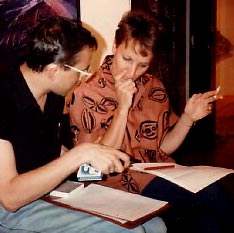
Sasha Soldatow and Pam Brown, 1984 That’s what I’m trying to infer, yes. That’s why I was reluctant to do an introduction. ¶ Do you think you ever will? I’ve had them before. One by Kate Jennings twenty-odd years ago — it was exciting to me then — it was feminist. Then later, in 1990, I asked Sasha Soldatow to write one. I was in a different frame of mind then. I wasn’t consciously thinking of historicizing but I hadn’t thought about what I was doing. Now, I probably wouldn’t do that. The poems are there. They contain elements of autobiography, history, time — all of that. ¶ Critically, there are two very divergent ways of viewing your work. One is to position it generationally and culturally. You’re of that ‘Generation 0f ’68’ projection and you’ll be viewed with Tranter, Forbes, Bolton, Vicki Viidikas and so on. Or, the very different view, and the one I favour more, and that is more of a maverick poet who has operated almost as a sub-culture in your own right. (I mean, textually, not as a person). The so-called Generation of ’68 was a populous generation of young Australian poets who identified with counter-cultural values and whose work was seen as iconoclastic and experimental, and not unrelated to an interest in sex, drugs and rock’n’roll. The label refers obliquely to the student revolt in Paris in May 1968. Well, the latter suits. I was never part of a poetic group. I remember in the 1970s when John Tranter and the New Poetry (magazine) people were together, I was aware of them but I had nothing to do with them because I was involved in the counter-culture. So I was making poems, screenprints, with friends who were making films and other things. We weren’t concentrating only on text or film or one area. I was never academically-based either. So, I suppose from that counter-cultural background I saw New Poetry (which I would hear about from Laurie Duggan, whom I’d met then) as already a committee, already a group that was involved in some kind of structure that represented power.
|
|
¶ A kind of cadre structure. Yes. And I suppose I was what could be termed a bourgeois individualist but I thought of myself of something much finer than that! Anyway, I didn’t socialise much with poets. We had a printing press in the front room and were involved in political activity — that kind of thing — and I was a poet, and other people in that scene were doing other things. ¶ It’s interesting in the age of email, Internet and web discussion groups you’re quite a prominent figure, and you’ve been extensively involved in dialogue, creatively. Collaboratively and interactively. That’s not really such a shift, though, from the position you’re describing. No, it isn’t such a shift. Text began to overwhelm other activities for various reasons. Perhaps in the mid-seventies in connection with feminism and being in a band — so taking poetry into songwriting and doing more communicative things rather than writing alone, which I now think of as kind of shameful. A Deleuzeian idea. 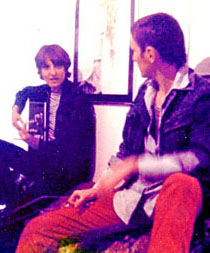 Pam Brown and Josephine Dewar, lead singer with ‘Sheila’, rehearsing a new song in Darlinghurst, Sydney, 1978. ¶ I don’t see that your poetry is in any way textually taken over — it absorbs all that. Reading through Dear Deliria you get this incredible sense that these are poems-and-other-things-as-well. They’re very physical in terms of the field of the page. They move in certain ways across the page, there is literally a structure and if not, there’s a reason — to jar the reader. So there’s a visual component to them even though they seem to be ordered in a specific way — every shift, indentation, whatever, is there for a rhythmic reason or sense. Also you use low/ high culture blends — market brands mixed with the emotional moment, and so on. All these things seem to be part of the poem rather than occupying or territorialising (to use Deleuze and Guattari) other art forms. They seem to live together. Well, of course. That’s the era we live in. But to go back, I simply meant that poetry became more prominent for me. Gradually, poetry became more of a modus operandi. ¶ Is this because of ‘language’? Is this because you see some kind of primacy in the word? Or is it a political choice ?
No. Well, possibly. But I think it was more accidental. And led to engagement in small groups of like-minds, for instance anti-poetry poets. In the Coalcliff days. |
|
|
|
¶ I was wondering whether a group allowed you to feel less self-conscious about the process of the bourgeois nature of writing poetry. You know, the space and time it occupies as a substitute for work, in the Marxist sense. If working in the anti-poetry field allowed you to engage with text without the same guilt. Well, I feel guilty all the time! Writing, as I was saying before, is a kind of shameful activity — a private activity. But it’s clean. ¶ Why’s it clean, Pam ? Because you can think about it without having to use charm or intonation and so on, as you do when you’re speaking. In talking, we’re in an encounter that’s kind of impure, dirty. ¶ In your poetry, charm and intonation would possibly be capitalised and would certainly be alliterated — you’d have ‘charm’ with ‘cacophony’, maybe. No that’s not the right one, but you’d have a repetition of ‘c’ sounds. Words that are focussed upon and suddenly become subjective are diffused in your poems by being parodied. You parody your serious moment in your own poems. I’m interested in this issue of cleanliness and cleansing in the poem because these techniques you use are almost distancing techniques. As you know I have an intimate connection with this manuscript [the press founded by John Kinsella published the book — J.T.], and one of the things that fascinated me in re-reading it from a critical point of view was how a Pam-Brown-poem struck me as being incredibly parodic, clever, and humorous in that cleverness, was actually distinctly emotional and there’s a great deal of emotional sincerity and it wasn’t as if it was so much masked, as diffused. You can never actually pinpoint it because it comes back, and it’s displaced, and displaced again. Is this technique something to do with the guilt issue and not wanting to be the bourgeois poet one can so easily become? I think you’re right. And it’s to do with notions of power and the text and audience. I’d hope an audience or reader would ‘get’ it but I’d also aim for some pleasurable aspect in that intelligibility. That’s what humour offers — you know, ‘come in’ — it’s open rather than all-knowing. 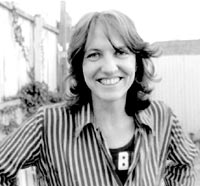
Rozelle Backyard 1978. ¶ Yes, I’d agree with that. You begin Dear Deliria with a quote from James Schuyler’s ‘The Night’ — ‘I order you : RELAX!’ Tell me, tell me... Well, it’s obviously so ironic. The Schuyler quote is just brilliant. But it’s also to do with nervousness and energy. ¶ Yes, in your poetry there is an urge to relax, but it’s never relaxed. There’s a kind of manic intensity to it but there’s a combination between fast and slow. I don’t know how you achieve that. Well, my partner Jane and I use an expression at our place — ‘on the qui vive’. We say that a lot. You know, we have to keep at it! I think the better expression is probably ‘aux aguets’. That’s more what happens, I think, with making poems. [‘Aux aguets’ — on the lookout — a colloquial expression that Gilles Deleuze used to describe a state of cultural awareness.] ¶ In your poetry there is a distinct dialogue that goes on between the persona and the reader. Sometimes it’s humorous, sometimes it’s actually threatening, it’s all sorts of things... but it’s a nervous relationship that I, as a reader, have with the text. One thing I noticed is that there’s a change from less nervousness in the earlier poems. It seems more nervous now, in a positive sense of not being satisfied with the persona telling. The poem can’t ‘tell’; it seems to tell us that it cannot afford to have authority. How much does that come through a negotiation of personal space — you know, where you write, how you write, your interactions with friends, and at work. Do you have a constant negotiation with space — is space an issue in your life in general ?
It certainly is. For instance, we live in a tiny flat. This is Sydney, and we’re not very rich, so we live in a small flat. My partner is writing French language text books and I’m writing poetry and editing, whatever. We share a computer and have a small study that’s full of my books but we share the space. But I don’t need a lot of accoutrements to write — I can use a tiny table and then go to the computer. Space is an issue but I can think of a parallel to do with names. It’s about reduction — I’ve been ‘Pamela Brown’, ‘Pamela Cocabola Brown’, ‘Pamela J.B. Brown’’ and now ‘Pam Brown’ and really, I wish I’d started out as just ‘p.b.’ ¶ You do negotiate those interactions especially with your writerly friends in your poetry. They’re there not quite in the same way, say, Ken Bolton involves himself in an open dialogue but they are incorporated usually in a specific line of thought, whereas Bolton tends to use them as a beginning. Yes, he extrapolates and goes off philosophically... ¶ And he digresses from the notion of interaction whereas with you, they seem to come more as internal points of reference that suddenly come from an idea that has led you to that, rather than them leading to an idea in Bolton’s case. It’s a quite different use of friendship but there is an overlap and a conversation that goes on between you as poets...
Well, the obvious thing is ‘personism’. Frank O’Hara. Although I didn’t consciously read O’Hara or read any of the New York poets and say ‘I’m going to do this’. In fact, in any of my copying (that you do when you’re trying something out) I never copied anything to do with the New York poets. I didn’t aspire to write like them, but I read them like crazy. It’s again an ‘anti-poetic’ to write-in friends, but the other thing is that they’re signifiers. ¶ It’s also a de-fetishizing. In Australian poetry, it seems to me, for over a hundred and forty years — since the 1870s — there has been a quest for community that’s never come off, and I want to know why this is. It can happen elsewhere but in Australia we try to construct it critically backwards, but it was never really there in the first place. It’s always in response to something — like the Jindyworobaks or even, I’d say, the little Coalcliff group. It’s usually in reaction to something disagreeable. Like the factions of the 1970s. But I don’t know why Australia is like that. People say the factions are over but I don’t think you can say that. There are always groups of poets who have agreements about aesthetics or politics or whatever. The Jindyworobaks were a group of Australian poets in the 1930s and 1940s with a nationalist agenda who attempted to resist the effects of internationalism by encouraging the use of aboriginal words and cultural concepts, and an Australian setting. ¶
I agree. I haven’t really thought about that too deeply or for too long. It’s something that’s fairly second-nature. I suppose, it might occur because I spent my formative years not with my mother, father, brother and sister but with a paternal great-aunt and great-uncle from when I was eighteen months old until around seven. 
Pam Brown as Little Red Riding Hood
They played music. They were old, they were Victorian — sort of funny old figures really. This was in Brisbane and they’d sit on the verandah with a mandolin and banjo-mandolin and sing songs. I learned to play, a little bit of banjo-mandolin, but there was a xylophone or marimba in my room so I when I was quite little I learned to play that. ¶ So you could spell by three. One of the things in interviewing poets over several years now I’ve found that almost to a t, even those poets who started late as poets, they say that at some point they had some kind of early connection with words in their background. Well, I don’t remember consciously learning to spell but I remember being applauded for being able to spell ‘exhibition’. We used to go the Brisbane Exhibition [a large annual agricultural show rather like a State Fair.] It was almost a party trick and I’d be praised for it. ¶ So it had an emotional aspect to it. You’d feel gratified.
Yes — it was something wonderful to do. It was probably my only act. ¶ Now, what about Russian futurism and the formalist critiquing of it. You know, the idea of the word itself. Your wonderful expression ‘flickering Gaudi’ and ‘poem written while writing a poem’ .This metatextual idea that things are implicit in themselves, that the signifier and the signified are actually self-contained. That’s right through your work. Have you read the Russian futurists? No, I haven’t. I’ve read Mayakovsky. ¶ In quite a few of your poems you can have a series of descriptions or references to, let’s say it’s ‘Coca-Cola’ or whatever it might be. A word can be disconnected from its outside references and is there because it has its own significance. That could go back to that isolated learning of spelling when young. That’s possibly where it originates. Although there was always an undercurrent of meaning because whatever you spelled, it had a significance for you. ¶ So, ‘flickering Gaudi’ —obviously there’s a play on what Gaudi represents and the moment it flickers it’s destabilised. But it has an internal music to it that goes beyond its actual referent point. It generates something entirely separate from its origins. Well that’s what I would hope to do. Isn’t that what poetry is ? ¶ Not everyone thinks that, Pam. But it has to lift off . I don’t mean that it has to go somewhere unlocated, or somewhere romantic, but the language has to lift off or else I’m not interested in it. ¶ What you don’t do is simply describe something. It never happens that way — there’s always some other play. The other thing I want to mention is surrealism. Were you ever interested in surrealism ? Yes. In my younger days. There was a surrealist exhibition that came to Australia in nineteen-seventy-something. It was so exciting. ¶ Indeed. I don’t remember the year, either, but it had a huge effect.
For me, already having an interest in the bizarre and anything off-centre, I liked Dada. So the surrealist show really excited me. It was an influence. But then, my interest segued into pop. The object became more to do with capitalism — the Warhol stuff. So I popped! |
|
|
|
¶
There’s the idea of the connection with the dream in surrealism, and the unconscious. [laughs] ¶ What I want to know is, is it the rural as a jam jar label? [‘Monbulk’ is an Australian brand of jam or fruit conserve.] Is this your pastoral? I guess so. I have to say ‘Yes! Monbulk is my pastoral !’ ¶ [laughs] — and it’s deployed perfectly as a cross between disdain and admiration.
[laughs] This is it. ¶ Now, colloquialism, aphorism and the incidental. Do you keep a journal ? Or do you memorise moments of interaction, those odd sayings and so on?
No I don’t keep a journal — I have done so in the past but not now. I have an erratic notebook. I have a couple of notebooks. Yes, I might write down something that strikes me. ¶
You show influences but you don’t imitate anyone but you play with the idea of influence. It’s such a patriarchal notion that one is mentored and influenced, and I think there’s a strong feminist statement in your work against that kind of canonical inheritance.
In the books, mentioning poets is two things — it’s probably a directive to the reader to go and have a look because if they’re interested in what I’m doing they may also be interested in the poet I mention. It’s also, I guess, cornily, a homage to that writer because I would probably only use work of writers I don’t like in inverted commas. I’d say where I found it. But generally, the borrowings are from poets I like. For example, I’ve pinched a few lines from Kenward Elmslie. He’s really interesting to me because his poetry, more than his song, tends to lift off into the abstract without going all the way. I also love James Schuyler and I think that Kenward Elmslie has a Schuyleresque notion of the quotidian but he lifts it right off into an imaginative realm. Kenward Elmslie was in Sydney recently, and so I confessed and asked him to sign the lines over to me, which he graciously did. |
|
|
|
¶ Okay. Do you think the reader should work when dealing with a poetic text, or do you think the poet has a responsibility to offer enough information for it to be decoded? I’m a strong believer that the reader should work.
Decoding ? Well, as I’ve said a few times before this, I aim for ‘intelligibility’. ¶ Maybe that’s an issue of intentionality though, because, for example, if something’s going to come from a very different cultural space than the one we’re familiar with, then we’re going to have to work hard. Oh sure ¶ So you mean that would be different from someone intentionally attempting to foil the reader. Yes. So, I do insist on maintaining intelligibility. However, for some people the stuff that I write goes over their heads — but I’d just say ‘well, maybe there’s an image or something that’s intelligible to you that might not be a terrible experience’ ¶ A noun ? Yes, a noun ! Yep. ¶
I like that proper noun and I know how that verb works ! I use parataxis in prose. There’s a collection of my prose called Keep It Quiet. But you have lineation in poetry. Anyway, it’s language-play or grammar-play that I enjoy, and I particularly enjoy open-ended conjunctions — things like that. It’s because I loathe conjunctions — so I have to use them. ¶ Take vengeance on them. Yes, I have to use them in a way that undermines something that might purport to be of ‘Great Importance’ without actually undermining meaning. I think I use grammar in an undercutting way. 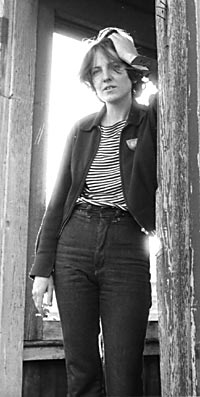 Pam Brown, Ultimo Powerhouse, Sydney, 1977. Photo by Werner. ¶ The mundane and the illuminated morph together textually in your work and the bricklayer is not superior to the musician, or vice versa. There’s no kind of hierarchy as such, and if there’s any sense that it might happen, you immediately undermine it, either grammatically or through lineation, so there is a very conscious play against any form of power... Yes, and I hope it also gives the pleasure of surprise. ¶ Here’s a challenge for you. We’ve been discussing primarily poetry of the intellect but I want to discuss another aspect of your work. In a poem like ‘This is all’, a love poem, irony is very gentle if not absent, but the language gives the impression it could lapse into this — it suggests irony is possible. Is sincerity dangerous and to be avoided ? This is a beautifully poised poem that remains, if you like, ‘pure’ in its intent. It’s a very beautiful poem. But there’s always something in the language that you manage to just hold back, something is withheld and maybe that’s what makes the poem work so well. So it avoids irony but suggests irony is possible — can you unravel this for me? |
This is all I think you’ve just done it. ¶ It’s from writing reviews!
But yes, you’re right — it is to do with a slight detachment that you need to have when you are speaking personally in poetry and in the 1970s I was given the same tag as many other women writers of being ‘confessional’ — but I was always careful not to be ‘a confessional poet’ (even though I probably was one). So, I think I refined that then — I learned to hold back poetically. It was important that the content be told, in the 70s, for the purposes of positive discrimination — so I suppose ‘the personal is political’ was all of that. I think I learned to write in a way that also undercut that, because, you know, if I read another feminist poem about, yawn, ‘menstruation’, say, just because it ‘IS’, because it’s female, I’d become really frustrated and would say ‘But you have to WRITE it as well!’ ¶ Yes, it has that classic ‘show, don’t tell’. Well, we know the kind of poetry — of loss and yearning . I think I’d also read too much Roland Barthes. You know, A Lover’s Discourse, and although it didn’t directly influence my poems of the time — I was a bit sick of it — you know, ‘oh come on Roland — brighten up...’ ¶ But as another identifier of bits of your modus operandi, ‘This is all’ can be read in so many different ways; ‘this is all’ as a kind of colloquial statement, ‘this is all’ —‘all’ being the focus — and so on. Often within the line, and you’re very particular about your lines, and in the ways that we argue about what defines a poem. Silly T.S. Eliot said ‘the perfect words in the perfect order’ which I’ve always thought was ridiculous... very fascist actually. [laughs] — yes, a friend emailed one of those to me this morning — John Forbes saying ‘eloquence is the only truth’. ¶ [laughs] An apothegm from John. ¶ He would have laughed himself. Well yes, I wrote back and said ‘I think John would argue against himself there’. ¶
Absolutely — the moment after he said it. rows of terrariums So, you know, it’s inevitable that I would get these lines — could you just say something about the language and the ethical subtext. Well, that’s a negative kind of poem isn’t it ? It’s trying to talk about ‘culture’ I suppose — whatever that is. And the language there — ‘dropping enormous thick clots’ is boring language. It’s almost onomatopoeic. And I intended it to be uninteresting. But, I think it’s because, like everyone, I worry about this strange, imbecilic world we’re living in where you can manufacture life — we’re all ‘made’ things, we’re all becoming cyborgs. So that poem partially draws attention to that without necessarily making a fixed statement. ¶ Do you know Donna Haraway’s book Simians, Cyborgs and Women: The Reinvention of Nature (New York: Routledge, 1991)? It’s interesting to me that in your work, apart from an obvious concern about ethics per se here, the text itself almost becomes cyborgian, almost becomes genetically modified and that’s what you’re talking about — the onomatopoeia. So I often wonder in reading these political components of your work if there is a wrestling between what you know as poet is right and what the persona, or the construction of the poem itself is doing language-wise. There seems to be a tension. Sometimes you let the language almost leave you and go where it wants. Yep. You’re right. To start with letting the language go — if you look at a poem like ‘The ing thing’( which you published as a pamphlet) — that’s a long poem that meanders but it’s very precise and concise and it’s about ‘ing’. I let the language work on me there — all sorts of things were coming in, like exclamation marks, fragmentary punctuation — it was like surrendering to a kind of abstraction that I don’t usually do. But controlling it. So that’s an example, but I don’t know what that’s got to do with politics and ethics ¶ Well, because you are talking about a specific issue that bothers you and at the same time the language is doing its own thing. So there’s a poetic tension. Well, the trouble with poetry and politics and ethics — let’s take as an example the recent invasion of Iraq by the US, our forces and the British. I found that, and many other poets found it hard to write about. I did write a war poem but it seemed puerile, almost journalistic (not that journalism is puerile) — because we were receiving so much. Also, I couldn’t write much at all at that time. Other poets I talked to had a similar experience. I mean, I did protest rallies and all those things but it still seemed hopeless. And so I think sometimes politics and ethics have to be lived. ¶ Earlier we were talking about how friends can become part of the poem — for Ken Bolton it’s extrapolation, and for you almost as internal references. Contrary to that, you use quotes as impetus and as objects in the same way that you’ll use an art object as a point to take off from with an idea. One of my favourite poems is ‘Twitching’ where you quote from Charles Bernstein ‘I/ learned to read by watching/ Wheel of Fortune when I was/ a baby’ — you use this self-contained quote as a counterpoint. [The quote is from Charles Bernstein’s ‘Clare-in-the-Building’.] Quotes are used to introduce a concept and I probably also use them in an emphatic way ¶ It’s an interesting word — ‘emphatic’. I don’t mean ‘to make a point’ but to underline what I’m doing. ¶ Almost as a support mechanism for the poem. Sort of... ¶ But I don’t think that’s what they do. I think that you’re almost having a conversation with the quote. A lot of your poetry seems to be a dialogue — with the self, persona, culture, poetry... Well, that’s the whole point. It’s all an encounter. ¶ Yes, your quotes are encounters for me. And when I’m reading the poem I keep thinking of the quote. That’s what I mean by ‘emphatic’ — it’s underlining what you read, as well as dialoguing with the quote. You’re right — I guess, I haven’t thought about that a lot. ¶ Well, that issue of high and low culture and truth — where is truth located and the role of the poet and the whole fabrication of the poem — can it ever be truth because of the fabrication comes into that Bernstein quote and in ‘Twitching’ — there’s the alliteration — ‘property, paltry, platitudes, puerile’ and the internals ‘flappable, lapsed’ all within short space of each other. It’s alliteration on the surface but it’s actually something else — I’m trying to find a new critical word for this — it’s almost an inversion ...
At the end of that poem, I try to reveal the method — ¶ Maybe. It’s a unique usage of technique though. They use that revolting expression ‘the poet’s poet’ but, as a poet, what I find interesting and what I can learn technically from your work is that there is always an inversion of classical technique — you do something else with it — so alliteration’s never really alliteration. It’s something we don’t have a word for — maybe I can coin it. But, jokes aside, that’s a metatextual thing — the OULIPO do it as well. Playing with technique so that it becomes a new technique — that fascinates me. That kind of espionage combined with transparency. There’s always these tensions. I think you’re an ‘espionage poet’ mixed with something else — hybridised. I wonder who I’m working for ? ¶
Now, I want to refer to another poem ‘This and That (I cite myself)’. I’ve taken down a series of words that came to mind — the issue of meaning, presentation, the incidental, the issue of occasion and you actually say in the poem ‘public-private continuum’ — so this is declared, — ‘a surveyor’s tripod clacks’ and ‘the hypermarket/ surveillance camera / attempts its capture-/ my nearly-beautiful/ every dream,/ my artificial memory/ daily.’ I’m not sure that the poem has that function — I think it’s more often simply descriptive. But that poem is probably another complaint about the way we live. Earlier you mentioned a review by David McCooey. In that, he said that in my poetry I am ‘cranky’ and that it verged on the ‘resentful’. I’d like to say here that I’m never ‘resentful’. There’s no resentment in any of my books. He’s wrong. Yes — but ‘cranky’, ‘upset’, even ‘disturbed’ by these things is what informs that kind of poem. It’s obvious, it’s what’s happening to all of us — it’s the same kind of thing as the genetic cultures issue. ¶ An issue of liberty. But it’s also that people think it’s ‘groovy’ or something to identify with some of these aspects — that’s what bugs me. Because people are fairly powerless these days, apart from having a rather meaningless vote. It give some hope, I guess, to go down with a pencil to the ballot box . It’s supposed to be ‘democracy’ — in my idealised world, I would prefer classic anarchism. ¶ That poem is more than a complaint. The big question is ‘Are you afraid?’ It strikes me that these are poems of fear — that you’re dealing with the real and the imagined. These are poems that are much about what you’re doing as a poet as they are about the outside world. They seem to be inverted ars poeticas — where you’re actually asking ‘am I complicit in this?’ Technically the caesuras and the counterpoint throughout the poem almost suggests paranoia. Well, as we know, paranoia is just a heightened state of awareness. I think I have that to a high degree — that state of being. Although I think I get more sleep than you’re reputed to. ¶ A number of things have changed very distinctly from your earlier poems and one thing is this increased, in a constructive sense, awareness of a paranoia. Even though you were more overtly politically resistant in your early poems but now there’s a kind of paranoia about the position of self, of authority...
Yes, well I’m deeply suspicious of all of that. It probably sounds like potted philosophy. There’s that very old question of the ‘self’. For some poets that’s their quest. ¶
And there is a tension in that process of disappearing.
It’s probably the closest I get to lyric. ¶ And it has, once again, the juxtaposition between the descriptive and some more emotional moment. Nothing exists as a straightforward emotional poem or a straightforward descriptive poem — there’s always a mixing. Yes, it’s mixing, not layering. ¶
The effect of this is to defamiliarise the author, or, at least, authorial intent. It’s what we talked about earlier — the problem of representing personal privacy in public (in publishing a poem). ¶ Do you use landscape and references to place, that you deploy with irony, as an anti-construction thing. The poems are located but they’re not like, say, the pastoral — where you take yourself to the place, you stand in the paddock and you wonder about life itself. For me, place is more of a starting point, more to do with a quotidian aspect. My poems don’t ever leave the street I’m on... ¶ They’re almost a photo-moment. It is cinematic. Yes — and it’s not always literally that street. And I use place and then extrapolate out — abstract out. Like a Ken Whisson painting — in the foreground a table with bottles and it moves by plane so that as they move outwards the shapes become buildings. So in the poem it’s also almost like a plane. ¶ But to play against that in some way in your poem ‘Scenes’ — ‘not a past/ I ever knew,/ but one I make up, tonight’. Who is and who becomes ‘the real Pam Brown’ in these set piece scenes — is this relevant or is all simulacrum as in ‘Not the town’. Is ‘Pam Brown’ as poet a construct or is it desirable for the reader to think she’s real ? It’s like a cyborg. It’s half and half — 50-50. One of the poems is called that — ‘Fifty-Fifty’. There’s an interplay. This probably sounds really pretentious — you know, an interface with yourself ! That’s really onanistic ! We might have to drop that. But it is something like that. I don’t want to have her there in the foreground and I don’t have to work that hard because she, whoever she is, doesn’t really want to be there. ¶ Here are some lines; ‘in fuck-the-reader-Timezone/ the premature ejaculators,/ their fingers on the game,/ hoot for joy every time/ they destroy another animation.’ I thought of the Gulf War immediately then. There’s a mixture of disdain, cultural observation and that paranoia again — that things aren’t real. Well, you’ve seen a Timezone. [A branded video-game arcade.] ‘Fuck the reader’ is, to me, what a Timezone is. ¶ Is it a call for community? You’re reading my poem — we should get together and fight or make or play this anti-art ? I’m not so sure. ¶ Let’s finish with the ‘flaggy’ ‘floral’ ‘fokkerschmidts’ and ‘a conjuration of imbeciles’. Yes, that’s Baudrillard. It emphasises — you know, ‘how imbecilic can things get!?’ ¶ But you also undercut it with proper-noun-play — ‘...Cash Converters/ for stolen cell phones’ — to pull the rug out. You use the ‘real world’. [Note: ‘Cash Converters’, a branded chain of stores where old goods can be traded for cash.] To take the edge off. You always have to question your own pomposity — to quote from Baudrillard for instance. ¶ This conversation has primarily been about technical things, how the poems are made — is there anything somewhat more subjective that you want to say?
No. 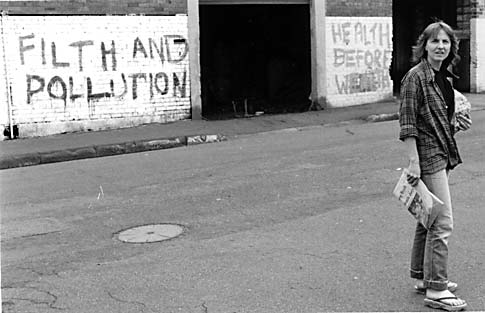
‘That’s all, folks!’ — Pam Brown, Rozelle, Sydney, 1979
Bibliography: Pam BrownBooks PublishedSureblock, P.Woolley, Melbourne, 1972 Cocabola's Funny Picture Book, Tomato Press, Sydney, 1973 Automatic Sad, Tomato Press, Sydney, 1974 Cafe Sport, Sea Cruise Books, Sydney, 1979 Correspondences, Red Press, Sydney, 1979 Country & Eastern, Never-Never Books, Sydney, 1980 Small Blue View, E.A.F./Magic Sam, Adelaide, 1982 Selected Poems 1971-1982, Redress/Wild&Woolley, Sydney, 1984 Keep It Quiet, Sea Cruise Books, Sydney, 1987 New & Selected Poems, Wild&Woolley, Sydney, 1990 This World. This Place, University of Queensland Press, Brisbane, 1994 50 - 50, Little Esther Books, Adelaide, 1997 Text thing, Little Esther Books, Adelaide , , 2002 Dear Deliria (New & Selected Poems) , Salt Publishing, UK/USA/Aus, 2003 ChapbooksLittle Droppings, Never-Never Books, Sydney, 1994 My Lightweight Intentions, Salt/Folio, U.K./Perth, 1998 Drifting Topoi, Vagabond Press, Sydney, 2000 eleven 747 poems, Wild Honey Press, Ireland, 2002 Other publications notedMagic Sam magazine, Ken Bolton, Anna Couani, Sal Brereton (eds.), Absolutely Furious Productions, Sydney, c. 1978
A Lover’s Discourse, Roland Barthes, Hill & Wang, New York,
1986 Jacket 22 — May 2003
Contents page This material is copyright © Pam Brown and John Kinsella
and Jacket magazine 2003 |